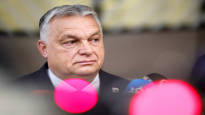The surface of the other EU countries began to tighten during the summit, when the positive signs given by Hungary at the beginning of the year disappeared.
Hannele MuiluEU correspondent
BRUSSELS The leaders of the EU countries are trying to turn Hungary to a common front to support Ukraine at an extraordinary summit on Friday. The EU leadership is meeting because Hungary settled in December, and support could not be agreed upon. The other 26 countries are in favor of paying the subsidy, but the decision requires unanimity.
Ukraine is promised 50 billion euros from the EU budget.
Especially the largest member countries Germany and France, as well as the current EU presidency, Belgium, have held strict negotiations with Hungary at an accelerating pace.
After Christmas with the Prime Minister of Hungary Viktor Orbán a willingness to compromise was seen from the direction and the country’s minister for Europe János Boka went around negotiating. For example, the Minister of Foreign Affairs of Finland Elina Valtonen (collective) interpreted after the meeting of foreign ministers of the EU countries that positive signals were visible. Then the situation got tense again.
Even though the solution could not be prepared before the meeting, an EU official who has followed the decision-making of the member states for a long time stated that no matter how many weeks of no, no, no, no, a solution can be found quickly in the end.
What is the solution to support jams?
Two main models in particular have been on display. In the second, Hungary agrees to a common support front, but demands an annual right to veto the support. The same rush would be ahead next year. This is not what the member states want, because Hungary would be able to extort the things it wants in return for support at regular intervals.
The European Council may discuss Hungary’s aid annually, but not on Hungary’s terms.
In the opinion of the other member states, the granting of the promised aid to Ukraine can be decided by a majority in the future.
In the contingency plan, 26 countries agree on support for Ukraine, and Hungary is left out. This would suit Orbán.
The states would grant support in Ukraine bilaterally, or a new financial instrument would be created to pay the support. The money would come from outside the EU budget.
However, making decisions by country and building a support instrument would both take time. Ukraine’s need for money is critical. EU support is intended to be directed to the running of the society and reforms of the war-torn country.
Nor would Orbán want to get his desired model through blackmail.
Researcher at the University of Helsinki Katalin Miklóssy assessed in Tuesday’s A-studio that Hungary has been financially pressured behind the support decision.
What does Ukraine want?
Hungary is trying to milk things in exchange for agreeing to support Ukraine, but there is no clear wish list.
What Hungary wants the most is money, i.e. EU subsidies, which have been frozen from it due to a violation of the rule of law. In December, the Commission released 10 billion euros to Hungary because, according to the Commission, the country had made progress in the required reforms. There are still 20 billion euros left.
Hungary is also hoping for money through the recovery tool established during the corona crisis.
Hungary may seek to gather influence while waiting for the rise of right-wing populists on the European political map. Poland, which stood in support of Hungary, turned from extreme right to center right in the elections, but in Holland, for example, the trend is different.
Hungary’s actions benefit Russia directly.
What will happen to the EU’s weakling?
According to EU officials, many member states are having enough of Hungary’s sleight of hand.
This is also evidenced by the fact that member states are discussing the introduction of Article 7, i.e. Hungary’s temporary ban on voting, at meetings of the EU’s councils of ministers.
The European Parliament voted in favor of the temporary abolition of the right to vote a couple of weeks ago. However, the member countries are cautious and the decision would require everyone’s support, which is unlikely to be found.
There are serious discussions in the EU about what to do with Hungary.
Member states fear for the EU’s credibility when its decision-making ability is cast in a questionable light. The US and China are watching how the EU works with the rebel.
